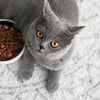What Cats Can (and Can't) Eat: Fishing out the Facts
- by Rufus and Coco
As the saying goes, a house isn’t a home without a furry friend around…even if their weaving between our legs can be quite perilous at times. And when it comes to whiskery kisses and purring devotion, cats offer us a depth of affection no other animal can.
Which is why, as their owners, it is our responsibility to provide them with the best quality of life possible. One way in which we can do this is through supplying them with a nutritious diet packed with scrumptious, natural ingredients, nourishing our cats from the inside out.
But before we delve into what food cats can and can’t eat, here’s a top tip for every feline parent: as obligate carnivores, a.k.a. mighty meat eaters, cats thrive on protein rich diets. Protein supports a cat’s heart, vision and reproductive system, and therefore if your cat becomes protein deficient, this can lead to severe complications.
Additionally, when it comes to selecting a brand of commercial cat food at your weekly shop, make sure to check out the ingredients. Ideally, meat should be at the very top of that list, as this means it's the most prominent ingredient in that food. Likewise, watch out for mention of ‘meat and animal derivatives’, as this means the ingredients are surplus from the human food chain - and so you may wish to look into exactly what quality of derivatives are used by that particular brand.
Now, let’s dive into what food will best support your cat’s diet:
Food cats can eat, in moderation:
Meat and Eggs
-
Canned or cooked fish (such as tuna. The omega-3 fatty acids in fish help with arthritis, kidney disease and heart disorders)
-
Fish oil supplements
-
Lean beef and deli meats
-
Ham (in small amounts)
-
Chicken
-
Turkey
-
Lamb
-
Cooked eggs
Dairy
-
Hard cheeses (such as cheddar)
-
Plain, low-fat and unsweetened yoghurt
Grains
-
Cooked corn, polenta and couscous
-
Oats and oatmeal
-
Bread and whole wheat breadcrumbs (whilst okay in moderation, bread is not a fundamental requirement for your cat’s diet)
-
Mashed brown rice and barley
Fruit + Vegetables
-
Avocado (with no pit)
-
Bananas
-
Blueberries
-
Peeled apples (with no seeds)
-
Carrots
-
Celery (great to crunch)
-
Spinach (but only if your cat has never or is not currently experiencing urinary/kidney complications)
-
Green beans
-
Asparagus
-
Broccoli
-
Peas
-
Cucumber
-
Pumpkin
-
Watermelon
Food cats can’t (or really shouldn’t) eat:
Meats and Eggs
-
Raw eggs
-
Cooked bones
-
Highly processed meats
Dairy
-
Chocolate
-
Soft cheeses
-
Milk (especially cow’s. You may be surprised to know that cats’ stomachs actually can’t handle dairy)
-
In general, any high-lactose products (read more about the cause of animal lactose intolerance here)
-
Ice cream
Grains
-
Any seeds and nuts
-
Raw dough
Fruit + Vegetables
-
Grapes and raisins (just a small amount could result in kidney failure)
-
Mushrooms
-
Green tomatoes
-
Chives
-
Garlic
-
Onions and shallots
-
Scallions
-
Plant-based milks
Additional human food cats shouldn’t eat:
-
Alcohol
-
Caffeine
-
Medications, supplements or recreational drugs (like marijuana)
-
Sugars (did you know that felines can’t even taste sweet flavours?)
-
Anything with xylitol (an artificial sweetener, often found in gum and candy)
-
Spices
-
Pasta (whilst cats can eat pasta, in the technical sense, it offers little to no nutritional value. Also, when prepared with sauces or butter, pasta dishes can then become toxic to cats, whilst tinned processed pasta is loaded with sodium and can cause obesity if consumed by your cat in large quantities)
-
Fat trimmings (high in calories and can cause pancreatitis)
-
Popcorn (whilst non-toxic to cats, popcorn can be a choking hazard and cause health complications when made with butter and salt)
Signs that your cat has ingested a dangerous food, or overindulged in a food that cats can eat but only in moderation, may include vomiting, diarrhea or an upset stomach.
But what about raw?
There are two schools of thought when it comes to raw feeding for cats.
Some sources will advocate that you should not feed your cat anything like sushi, or bites of raw bacon or salmon, due to suggested infection risks. Whilst other sources promote raw feeding as offering myriad benefits for our feline friends.
The RSPCA states that ‘fresh human-grade raw meat’ and ‘raw meaty bones’ can be incorporated into your cat’s diet, to provide variety. Yet we would always recommend doing your own independent research and talking to a trusted vet first about raw feeding.
We hope this blog has helped answer your question of what foods cats can and can’t eat. When it comes to creating a tempting, tasty and wholesome diet for your cat, remember to bookmark this blog so you can refer to this list for guidance.
If you’re searching for a natural cat treat, packed with protein and minerals, sustainably sourced and featuring no preservatives or fillers, check out our Reel Fish Crunchers.
Also, discover our Vitality Plus nutritional pet powder to add some extra nourishment to your fabulous feline’s diet.
- Posted in:
- cats
- food
- health-tips
- how to help
- tips







